DO-IT News July 2022

Volume 30, Number 3
Below are the articles from the DO-IT News July 2022 newsletter. These articles can also be seen all on one page at the Full Newsletter option.
Meet the 2022 Scholars!
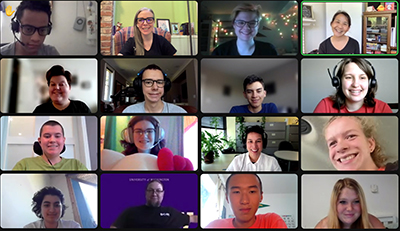
This summer DO-IT will host its thirtieth annual Summer Study program for DO‑IT Scholars, which again will be hosted online. So many things have continued to be different in the last year, continually changing, and though we have all been challenged, we have found many benefits to this growth in our online programs and abilities to connect with those across wider distances. Even though the delivery of our DO-IT Summer Study has been modified to make sure we are as inclusive and safe as possible, the main purpose of our program has not changed: DO-IT provides participants with opportunities to learn about postsecondary education, life on a college campus, challenging academic and career fields, networking, and technology, and we have fun along the way!
Primary funding for the Scholars program is provided by Washington State.
I am pleased to introduce to you the 2022 Scholars:
Alexis attends Richland High School and will be participating in the Tri-Tech Veterinary program in the fall. She enjoys hanging out with her friends and writing. She has ADHD.
Arun attends Nova High School in Seattle. He enjoys programming, writing, math, and visual arts. He is disabled.
Ashley is a rising junior in Snohomish County, Washington and enjoys music, art, sports, and English. She is looking forward to studying in college and seeing where her aptitudes and abilities take her as she meets the challenges of having cerebral palsy due to an early birth.
Bella attends Ellensburg High School. She enjoys hanging out with her pets including a cat, dog, rabbit, lizard, goat, and duck. Her favorite subjects are math and Spanish. She has a learning disability.
Cameron attends Auburn Riverside High School where he enjoys studying electronics and computers. He has autism.
Chris attends Academy for Precision Learning in Seattle and will be a senior in the fall. He has autism, ADHD, and a learning disability. Chris is volunteering at the Museum of Flight this summer as a pavilion ambassador. He enjoys playing the piano and saxophone, and he loves sports.
Cosey Mo went to Port Townsend High School but recently moved to Port Angeles. She looks forward to joining the rowing club at her new school. She enjoys playing soccer, sewing, drawing fashion outfits, and walking with her dog Elwood. She has a learning disability and narcolepsy.
Ethan attends Battle Ground High School. He has ADHD. He enjoys music, puzzles, and building computers. He is also secretly three kick drums in a trench coat.
Francine has attended school in Washington for over 10 years including Shelton High School. She enjoys singing, swimming, dancing, bowling, and spending time with friends. She has autism.
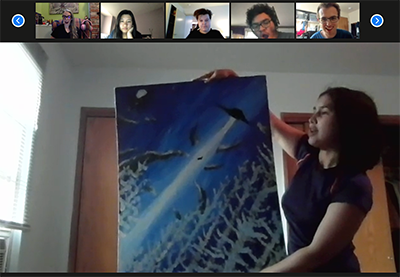
Hannah attends Lakeside High School in Nine Mile Falls. She has autism. She enjoys creative writing and drama club. She hopes to write novels.
Jordan attends school in Washington State where he enjoys studying aerospace engineering and science. He plans on going to college to study these topics.
Kimo attends Lakes High School and hopes to study painting and engineering in college. Kimo enjoys drawing, painting, reading, and exercising. Kimo has autism.
Maddie attends Richland High School. She has ADHD, autism, and cerebral palsy. She enjoys piano, swimming, and crochet. She hopes to pursue a STEM field in college.
Malik attends school in Washington state. He enjoys biking, watching videos, playing with his dog. He plans to pursue a career in writing. He has disabilities.
Mark attends Richland High School. He has cerebral palsy, learning disabilities, ADHD, and autism. He hopes to be a history teacher or study medicine. He enjoys playing video games and swimming.
Oliver attends Juanita High School where he enjoys studying English and history. He enjoys piano, cooking, and listening to music. He has ADHD.
Oscar attends Issaquah High School. He has bilateral hearing loss. He enjoys running, biking, and learning new things. He would like to pursue a career in either astronomy or medicine. He loves geography too.
Sage attends Roosevelt High School. She enjoys cooking, art, hanging out with friends, and playing a variety of sports, including basketball, soccer, baseball, and tennis.
DO-IT Japan
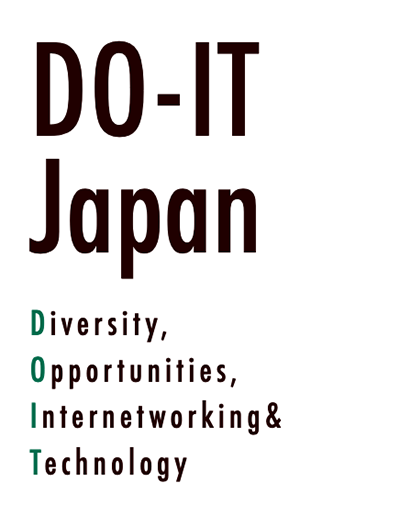
DO-IT Japan will celebrate its 16th Summer Study in August 2022, after starting the project in 2007, modeled after DO-IT at the University of Washington. Each year, up to 10 scholars are selected and welcomed from all over Japan, with a total of 130 Scholars currently a part of the DO-IT Japan community. Sixty Scholars have physical disabilities, 38 have autism, 26 have learning disabilities, 15 have visual impairments, 11 have attention-deficit/ hyperactivity disorder, 9 have health-related disabilities, 7 are hard-of-hearing, 4 have a mental illness, 4 have cognitive disabilities, 2 have intellectual disabilities, and 5 fit into other categories; some Scholars fit into multiple categories. In addition, approximately 3,600 students and parents currently participate in our Outreach Program, in which DO-IT Japan delivers information to enrollees on the use of technology and other topics and conducts seminars several times a year.
Scholars are primarily high school students; in the beginning, DO-IT Japan welcomed only high school students as Scholars. However, since Japan did not have anti-discrimination laws at that time, students with disabilities had difficulties overcoming social barriers in the regular high school admissions process without reasonable accommodations. We wanted to be able to provide opportunities for students to participate in our program at an earlier age and learn to use technology in ways that fit their characteristics and learning styles, as well as support and advocate for their transition to middle school and high school. Therefore, we are currently providing a program that allows students from third grade to participate in some of the Summer Study programs as special auditing students, and we now welcome some middle school students to participate fully in our program.
Subsequently, with the enactment of the anti-discrimination law in Japan in 2016, inclusion in schools has gradually improved. Inclusion in the public elementary school and university education system has improved a lot. However, inclusion in most junior high schools, high schools, and private schools still has a long way to go. In 2024, the anti-discrimination law will be revised, making it mandatory for private schools to provide reasonable accommodation. After that, we expect to see another big positive change.
The DO-IT Japan community has matured over the past 15 years. Senior Scholars who have grown up are supporting junior Scholars and participating in the management of the DO-IT Japan office. I was a visiting scholar at the DO-IT Center in Seattle from 2010 to 2011. During that time, I saw older Scholars working as staff and mentors. I had hoped that someday DO-IT Japan would do the same, and now, in fact, DO-IT Japan’s activities are supported by young people with disabilities, which makes me very happy.
The 2020 and 2021 Summer Studies were conducted entirely online for COVID-19. DO-IT’s Summer Studies allow students who are often isolated when they are in local schools around the country to meet their peers with disabilities and to experience college campuses and the new learning and values that are available there. While the online experience is valuable, this year’s Summer Study will offer a limited, but exciting, opportunity to meet in person. We look forward to feeling the impact of these encounters again. We also look forward to a future where DO-IT USA and DO-IT Japan Scholars will be able to meet, transcending the national differences between Japan and the US.
Learn About Access to Informal STEM Learning
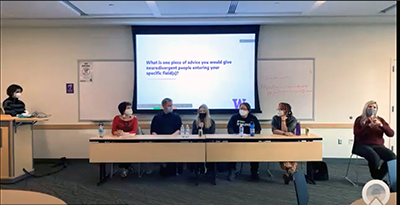
In March, the Access to Informal STEM Learning (AccessISL) project collaborated with the NSF INCLUDES Alliance: The Alliance of Students with Disabilities for Inclusion, Networking, and Transition Opportunities in STEM (TAPDINTO-STEM) to host an online event called the Access to Informal STEM Learning Capacity Building Institute (CBI). The proceedings are available online.
Presenters represented organizations from all across the United States, including the Intrepid Sea, Air, and Space Museum; the Riverside Art Museum; the Pacific Science Center, the Minneapolis Institute of Art, and the National Federation of the Blind.
At the event, attendees shared challenges and solutions regarding equitable access to ISL. They identified specific ways stakeholders can work together to increase universal design, accessibility, and systemic change as it relates to informal STEM learning.
“The vision is that museums can make the world a better place, and the power of museums lies in the role of the playing, learning, well-being, community-building, and social justice. Museum professionals are connectors and that means that inclusion is central to our work—inclusion for all,” said AccessISL co-PI Meena Selvakumar on the Museology Master of Arts Program’s core beliefs.
Huskies for Neurodiversity
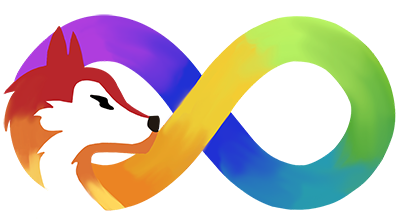
University of Washington students now have their own organization dedicated to building awareness about neurodiversity and to destigmatizing diverse forms of brain functioning (such as those affected by attention deficit hyperactivity disorder, autism, dyslexia, and Tourette syndrome, among other conditions).
Huskies for Neurodiversity (HfN), founded by four undergraduate students in spring 2021, won a 2021 Husky Seed Fund award as an initiative to enhance the university’s inclusiveness, inventiveness, and impact. The group has pledged to “educate the UW community about neurodiversity, compile resources for neurodivergent students, and amplify the lived experience of neurodivergent people.”
HfN’s founders were inspired to launch when they saw a need to build stronger communities and more awareness of neurodiverse experiences at universities and beyond. “We were hoping to start the conversation on campus and provide a space for people to feel seen and heard as neurodivergent students,” says Tiara Schwarze-Taufiq, HfN’s outreach coordinator and a graduating senior at UW.
Through the 2021–22 academic year, HfN’s projects included collecting “lived experience” testimonials from neurodiverse community members, researching and writing articles on neurodiversity topics, and designing a website that will host these materials and serve as a platform for future content. The group expects the website to launch this summer.
In April, HfN organized and hosted the event “Huskies for Neurodiversity: Get to Work!” the first of what it hopes to be an annual series of panels that represent neurodiverse learner perspectives. The event—held on-campus, livestreamed, and shared via Zoom—had more than 50 attendees. Focused on the topic of transitioning from college into the workplace, the panel represented different work backgrounds and educational perspectives. Panelists’ neurodivergent identities included autism, dyslexia, and ADHD.
The panel discussed a range of subjects, including advantages of neurodiverse conditions in the workplace, overcoming challenges, disclosing disabilities, setting work expectations, and self-advocating. Questions came from the moderator, Schwarze-Taufiq, as well as from live and remote audience members, using online polls to select questions.
Building on the success of this event, the project continues to host less-formal social events, such as the one held in May. HfN’s leaders are looking toward the group’s future. They’re encouraged by more than 50 students who participated this year, and they hope to recruit new participants for 2022–23.
During HfN’s first year, the DO-IT Center provided staff support with technical assistance and event promotion. For more about HfN’s work or how to join, email huskies4neurodiverse@gmail.com. Watch a recording of the panel discussion online.
Recent Awards Within the AccessComputing Community
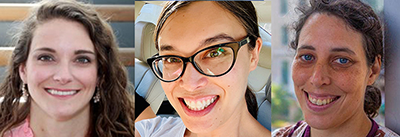
Multiple members of the AccessComputing team have received awards already in 2022, including Co-PI Stacy Branham, senior staff Amy J. Ko, and partner Jennifer Mankoff.
AccessComputing Co-PI Stacy Branham has received two awards in 2022. She received the Celebration of Teaching, Digital Accessibility Innovator Award from the University of California, Irvine where she is an assistant professor. She also recently received the Virginia Tech Computer Science Early Career Alumni Award from her Ph.D. institution.
AccessComputing senior staff Amy J. Ko was chosen to join the SIGCHI Academy in 2022. The SIGCHI Academy is an honorary group of individuals who have made substantial contributions to the field of human-computer interaction.
AccessComputing partner Jennifer Mankoff, representing the Center for Research and Education on Accessible Technology and Experiences (CREATE), is the 2022 winner of the ACM SIGCHI Social Impact Award for promoting the application of human-computer interaction research to pressing social needs. This same award has been previously won by several others with AccessComputing connections, including Lillian Hayes, Jonathan Lazar, Jacob Wobbrock, and Richard Ladner.
DO-IT Director Helps Plan Five Conversational Webinars Around Accessibility in STEM
DO-IT Director Sheryl Burgstahler recently worked on one of the National Academies of Sciences, Engineering, and Medicine’s ad hoc planning committees to arrange and hold a series of talks about best practices for enhancing accessibility for individuals with disabilities in fields that do field and laboratory research. The following topics were discussed:
Framing the discourse (for example, which disability should be the focus of these first discussions? What are the experiences of persons with various forms of impairments when it comes to field and laboratory work? What has changed since the epidemic of COVID-19? What are some of the most prevalent issues?)
- Eliminating barriers to full involvement in field and laboratory research by people with disabilities;
- Accommodations that are promising for expanding accessibility;
- Commonalities and variations among options for field and laboratory work that handle accessibility challenges;
- Individually successful approaches that can be scaled up into a generalizable practice;
- Mentoring or other support networks that have the potential to improve inclusion; and
- Leading sustainable practices and policies for accessibility and inclusion in field and laboratory science.
Learn more about the topics of each of the five webinars, as well as find links to the webinars and supporting keynote talks from the main presenters, online.
College and University Disability Services Staff: A Panel Q&A
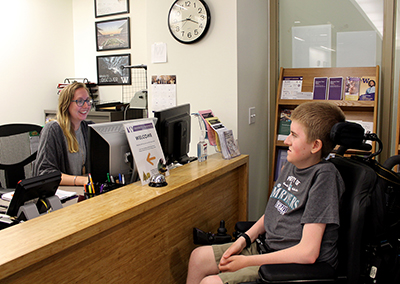
This panel featured disability support staff and was moderated by AccessComputing staff member Eric Trekell, who is also the former director of disability services (DS) at Everett Community College. It was held on Thursday, February 24th, from 4:30-5:30 online, and features questions around student accommodations, advice for students talking to faculty, documentation, and a variety of other topics.
Panelists:
- Wendy Holden, Director, Disability Services, Central Washington University;
- Megan Jasurda, Director, Disability Support Services, Clark College;
- Adiam Tesfay, Director, Disability Resource Center, University of Washington;
- Kim Thompson, Senior Director, Disability Services, Seattle University.
What do you wish students knew about asking for accommodations? Does that advice differ based on their disability?
- An “interactive process” for accommodations is required by law; it’s that first meeting but it’s also an ongoing dialogue that happens the entire length of your post-K-12 life, in higher ed and work settings. Understanding that is important.
- Accommodations happen in context. The accommodations you had in high school will be different from what you have at a 2-year college, maybe different from the ones you have at a 4-year college or grad school, and different at work. It depends on your disability, your major and your classes. What you need in a lecture class may be different than in a lab class or at work. It’s flexible.
What do you think are good practices for students in how to approach their faculty to talk about their disability and their accommodations?
- Faculty have a singular focus on their subject and they love their subject so much. Approach them with this idea: “I want to learn this great subject that you love so much, but normal academia creates these barriers for me with my disability. What is the best way to use my accommodations to help me learn from you?”
- You don’t have to disclose your disability but talk about how it affects you.
What approach does your institution take with respect to documentation of a disability?
- The law allows variation among campuses. A list of desired documentation may be on the DS website. Call and ask!
- We can work with a student and find out if the documentation they have is sufficient. Sometimes we can help them to get the documentation they need from a medical or counseling clinic. Sometimes we can take a student’s self-report, where a student talks to us about their experiences, including their health barriers and how those barriers result in academic challenges. A self-report also includes their past experience with accommodations, if any.
If a student is considering applying at your institution, can they meet or call to talk with disability office staff to find out what type of accommodations they might receive?
- Whether or not you can meet before being admitted varies between campuses. We’re required by law to have an official meeting with you to set your accommodations. Most of our offices don’t have the staffing capacity to have “pre-meetings”. It’s really a “whole process” and it needs to take place after you’re admitted and preferably when you’re enrolled for your first classes.
- If a prospective student really wants, most of us will have a brief “informational” meeting but we’ll never promise specific accommodations at that meeting.
Can a student have an advocate or service provider at the meeting with DS staff?
- Yes! A student can bring any person to any meeting at any point. But so can we; our goal is a positive, supportive relationship with you, but if you bring a lawyer to the meeting without telling us in advance we may reschedule the meeting so a campus lawyer can attend, too.
- Because of FERPA, it can be a problem if a parent or advocate wants to email or call or meet and make decisions without you. You, the student, are responsible for your accommodations process, not your parent. This is totally different from your high school experience.
- If a parent or service provider starts to overstep a little, then we have to have a conversation explaining that the student is in charge, not the parent.
Do you have any advice for students who may feel that their DS office might not be helpful?
- Every DS office is required to have a “complaint process,” and they should provide you with that information at the first meeting, or let you know where to find it. There may be an “informal” process and a “formal” process.
- If the DS office is large enough to have a director and other staff, and you have a complaint about a staff member, then making that complaint to the director is always the first step. In a DS office of one person, their supervisor would be the first step in an informal complaint process.
- The formal process usually starts outside the DS office; again, this process varies, but it should be posted on the DS web page and in the student handbook. It could be a campus ADA or Title IX coordinator. If you can’t find that information easily, it’s ok to ask someone else. A staff member at the Diversity office, or an academic advisor are good places to ask for that advice and guidance.
- There’s also an off-campus formal process all students have access to: the US Department of Education’s Office for Civil Rights (OCR) has a complaint form on their website. It’s usually best to try the formal campus process first, because OCR will want to know if you tried resolving the issue on campus.
What advice would you give to a student who is heading into a research internship, either on their campus or on a different campus?
- That varies on campuses; a paid internship can mean you’re an employee and now it is a workplace modification for human resources (HR). An unpaid, graded internship is probably a student accommodation with the DS office. Probably!
- Whether the internship is on your campus or another campus it’s ok to start by contacting the DS office, explaining the internship and asking. They’ll know the process and will refer you to HR if appropriate.
- Regardless, you’ll probably meet with someone to provide information, maybe documentation and discuss: What is the actual work? Are accommodations needed in that research space? Does the internship supervisor need to know?
What about when I’m looking for a job? Should I specify my disability right away? Do you advise that a job applicant reveal their disability on the application form?
- That’s a personal decision. Some applicants are very up front and reveal immediately in their cover letter: “This is my disability and this is what I need.” Sometimes an employer will appreciate that and know what to expect if they hire you. But, while it’s illegal discrimination, you could be “screened out” if you reveal in your cover letter. No one would be able to prove that discrimination occurred.
- Most application forms now ask if you have a disability; it’s usually ok to disclose that on the application, because that response is only collected by the HR office for demographic reporting data, which is not supposed to be shared with the people who screen and interview applicants.
- If you need an accommodation for the application process, you need to ask for that accommodation; again, that’s usually part of the application form and should only be seen by HR, and would be arranged by HR, not whoever would be your supervisor. If you can get through an application process without an accommodation then it’s appropriate to wait to disclose your accommodation needs to the HR office after you’ve been hired.
NNL Featured in Engage and Enable Blog
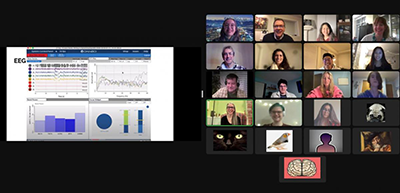
Recently, DO-IT’s Neuroscience for Neurodiverse Learners (NNL) hosted an event and was featured in an article at the UW Center for Neurotechnology’s Engage and Enable blog.
The article, titled "Increasing Diversity in STEM: CNT Students Encourage Neurodivergent High Schoolers to Explore Neuroscience," shared information about NNL’s event, which featured short talks by five student researchers. The high school students in attendance, DO-IT students who identify as neurodivergent learners, displayed their interest and curiosity with insightful questions. Here is a brief excerpt from the article:
The event began with brief introductions by DO-IT’s Tami Tidwell, an NNL leader who helps students navigate project opportunities and summer camp experiences. “When I think about neurodivergent learners in STEM, I think of a wide variety of strengths that differ from person to person, such as creativity, focus, and direct communication,” shares Tidwell. “Too often, people make assumptions about what these students can and can’t do well. One of our goals is to help students and educators understand the value that neurodivergent individuals bring to the classroom, the workplace, and the world.
June 2022 AccessAdvice
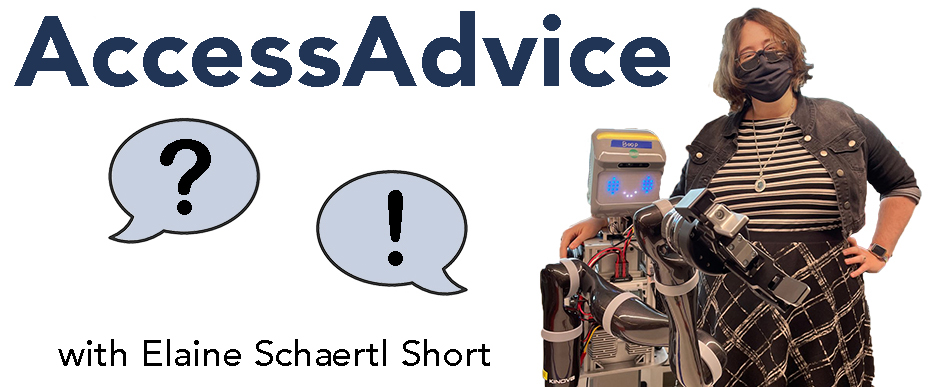
Welcome to “AccessAdvice”, a new advice column on accessibility and disability issues written by Elaine Schaertl Short, an AccessComputing co-PI. Before we start, some important disclaimers: everything I say represents only my opinion as an individual, not the opinion of any organization or funder, and I am not a lawyer or medical professional and none of the following should be construed as medical or legal advice. If you’d like to ask a question, email accesscomp@uw.edu with the subject line “AccessAdvice.”
I am currently taking a semester of medical leave and am actively interviewing for internships. Is it okay not to disclose the fact that I’m on medical leave during my interviews? I never lie, and my graduation date is still the same, but I do not feel comfortable informing my interviewers of this. Any advice on how to proceed going forward? – I Never Lie
Dear I Never Lie,
First of all, your instinct not to lie is definitely correct: an interviewer only has a limited amount of time to make a judgment on you as a candidate, and you don’t want to raise questions in their mind about your integrity, even if this is an exceptional circumstance. You don’t have to bring it up, but make sure you have a good answer ready if you’re asked a question about something like your current classes. My recommendation is to aim for an answer with three characteristics: a matter-of-fact tone, minimal information, and a pivot to a new topic. The phrases “medical stuff”, “family issues”, and “a family emergency” are pretty standard in the adult world to mean “something that is personal that I don’t want to talk about”, and most people won’t ask follow-up questions. You can also say things like “I’d prefer not to get into it” if they express concern or ask questions – just use a friendly tone and most people will leave it alone, especially if you then change the topic by turning the conversation back to something relevant to the position. Feel free to use one or more of these examples (adjust to fit your situation):
- I’m actually on leave this semester to deal with some medical stuff but I’m looking forward to taking algorithms in the spring—I’ve really been enjoying my math classes!
- I’ve had to take this semester off from classes to deal with some family issues, but I’ve been working on learning to use PyTorch. I recently got a system set up to recognize my handwriting, which I’m very excited about.
- Oh, I’d prefer not to get into the details, as I’m sure you can imagine they’re not very pleasant, but everything will be under control by the summer. Could you tell me more about the database system you’re using? I’m really interested in getting more backend experience.
As I alluded to above, there are a couple somewhat more valid reasons an interviewer might have follow-up questions: first, they may be concerned about whether you will actually be available when the internship starts, and some internship programs may require that you be a current student at the time of the internship. It’s really up to you whether you want to head off these concerns by addressing them directly (I’ve included one example above), or wait until you’re asked directly. At most universities, you’re considered a current student over the summer if you’re enrolled for the spring before and fall after but you’d want to check in directly with your university to confirm.
If you won’t be a current student at the time of the internship, I would probably recommend you mention that you are on leave (but not why) once you have an offer—if the internship does have a requirement that you be a currently-enrolled student, you don’t want to find that out on your first day while filling out new-hire paperwork. You don’t have to make a big deal of it or reveal any details, just say something like “I wanted to mention that I am on leave from the university to deal with [some medical stuff/a family emergency/family stuff]. Things will be fine by summer, but because of how leave works at my university, I won’t be a currently-enrolled student again until fall. Is that going to be a problem on your end?” If they do require that you be considered a current student in order to start the internship, then I would get in touch with an advisor or the person managing your medical leave as soon as possible; there may be a way to enroll part-time in internship or co-op credits so that you count as a student.
Whatever scripts you decide to go with, you’ll probably want to practice them like you’d practice any other interview question. You’re aiming for a relatively light tone; remember that most working adults have had to take some time off work for some reason or another, so this is a pretty normal exchange to have during an interview. Except to confirm that you will to be available and whether or not you’ll be considered a currently-enrolled student, any additional questioning on the topic should be met with polite deflections (the last bullet above is an example). If you get the sense that they are just being nosy or trying to get you to disclose a disability, just say “I’d prefer not to discuss it. Do you have any more questions related to the interview?”
It’s unlikely to come to that though, so just stay calm, have some answers prepared, and I’m sure you’ll do great. Good luck in your interviews!
Exploring Computing and Information Sciences/Technology Research for Deaf and Hard-of-Hearing
On April 19, 2022, deaf and hard-of-hearing undergraduates in computing and technology fields came together for a virtual workshop about computing/technology research and applying to graduate school.
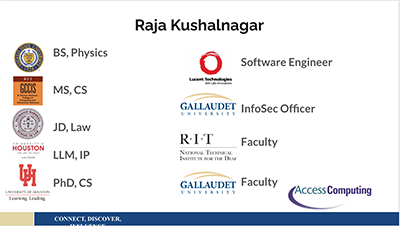
I gave the first presentation of the workshop, A Journey to a Career in Computing, focusing on my career path through school and my career. We had a panel discussion with deaf graduate students and recent Ph.D. graduates, Daniel Seita (Carnegie Mellon), Alex Lu (Microsoft), Abraham Glasser (Rochester Institute of Technology - RIT), Brienna Herold (RIT), and Lizzie Codick (RIT). AccessComputing PI Richard Ladner shared about applying to graduate school and Sarah Augustine shared about internships with the National Geospatial-Intelligence Agency (NGA).
There were many interesting points raised throughout the workshop. The panelists discussed ways to regularly correspond with support services and get needed resources to navigate the rigors of graduate school. They attributed their success to working hard, paying attention, and asking questions when they didn’t understand something. The panelists also discussed the importance of setting aside time to correspond with the support services to arrange for interpreters, captioners or other support services. Universities that have a critical mass of deaf or hearing students have larger, more knowledgeable support services that can take on the time to arrange for interpreters and reduce the students’ burden. They talked about taking a holistic approach in adopting varying support services in communicating with their peers, advisors, and others and in building a strong network of friends and mentors for advice if there are any issues in providing opportunities for them to pursue during and after graduate school.
Check Out the Knowledge Base
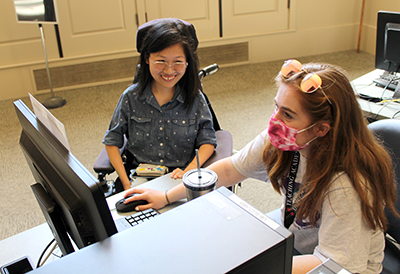
Since 2002, the DO-IT Center has maintained a searchable Knowledge Base of concise Questions and Answers, Case Studies, and Promising Practices with articles related to assistive technologies that allow people with disabilities to use computers, the design of accessible websites and documents, transition from college to careers, and a wide range of other topics of interest to DO-IT collaborators. There are over 850 articles included now and the Knowledge Base continues to grow. It can be accessed by selecting the “Knowledge Base” button in the home bar.
An important feature of the Knowledge Base is that it is tailored to specific projects. For example, our AccessADVANCE project (funded by the National Science Foundation under grant # NSF award HRD-2017017, HRD-2017054) helps departments and institutions become more welcoming and accessible to women faculty with disabilities. From its home page, if you select the Knowledge Base button, you will find over 200 articles of the master collection that are relevant to this effort.
We continually update articles and create new ones; for suggested edits to existing articles or to submit a draft of a new one, send an email to doit@uw.edu.
About DO-IT
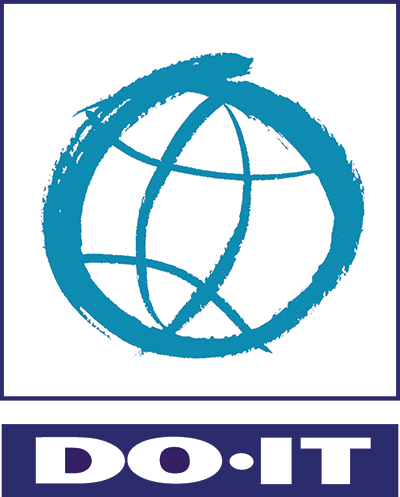
DO-IT (Disabilities, Opportunities, Internetworking, and Technology) serves to increase the successful participation of individuals with disabilities in challenging academic programs and careers, such as those in science, engineering, mathematics, and technology. Primary funding for DO-IT is provided by the National Science Foundation, the State of Washington, and the U.S. Department of Education.
For further information, to be placed on the DO-IT mailing list, request this newsletter or other materials in an alternate format, or make comments or suggestions about DO-IT publications or web pages, contact us at
DO-IT
University of Washington
Box 354842
Seattle, WA 98195-4842
doit@uw.edu
www.uw.edu/doit/
206-685-DOIT (3648) (voice/TTY)
888-972-DOIT (3648) (toll free voice/TTY)
509-328-9331 (voice/TTY) Spokane
206-221-4171 (fax)
Founder and Director: Sheryl Burgstahler, Ph.D.
Program Manager: Scott Bellman